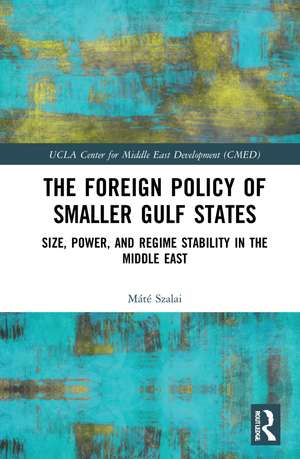The Foreign Policy of Smaller Gulf States: Size, Power, and Regime Stability in the Middle East: UCLA Center for Middle East Development (CMED)
Autor Máté Szalaien Limba Engleză Hardback – 28 sep 2021
The small states of the Gulf (Bahrain, Kuwait, Oman, Qatar, and the United Arab Emirates) managed to build up considerable influence in regional politics over the last decade, although their size is still considered an essential, irresolvable weakness, which makes them secondary actors to great powers such as Saudi Arabia or Iran. Breaking down explicit and implicit biases towards largeness, the book examines specific case studies related to foreign and security policy behaviour, including the Gulf wars, the Arab Uprisings, the Gulf rift, and the Abraham Accords.
Analysing the often-neglected small Gulf states, the volume is an important contribution to international relations theory, making it a key resource for students and academics interested in Small State Studies, Gulf studies, and the political science of the Middle East.
| Toate formatele și edițiile | Preț | Express |
|---|---|---|
| Paperback (1) | 387.42 lei 6-8 săpt. | |
| Taylor & Francis – 31 mai 2023 | 387.42 lei 6-8 săpt. | |
| Hardback (1) | 1001.07 lei 6-8 săpt. | |
| Taylor & Francis – 28 sep 2021 | 1001.07 lei 6-8 săpt. |
Din seria UCLA Center for Middle East Development (CMED)
-
 Preț: 392.87 lei
Preț: 392.87 lei -
 Preț: 308.06 lei
Preț: 308.06 lei -
 Preț: 433.90 lei
Preț: 433.90 lei -
 Preț: 494.66 lei
Preț: 494.66 lei -
 Preț: 416.26 lei
Preț: 416.26 lei - 15%
 Preț: 426.20 lei
Preț: 426.20 lei - 15%
 Preț: 698.17 lei
Preț: 698.17 lei -
 Preț: 489.26 lei
Preț: 489.26 lei -
 Preț: 443.78 lei
Preț: 443.78 lei -
 Preț: 413.33 lei
Preț: 413.33 lei -
 Preț: 430.94 lei
Preț: 430.94 lei - 26%
 Preț: 819.90 lei
Preț: 819.90 lei -
 Preț: 418.13 lei
Preț: 418.13 lei - 13%
 Preț: 337.39 lei
Preț: 337.39 lei -
 Preț: 415.24 lei
Preț: 415.24 lei -
 Preț: 369.43 lei
Preț: 369.43 lei -
 Preț: 360.43 lei
Preț: 360.43 lei -
 Preț: 363.53 lei
Preț: 363.53 lei - 17%
 Preț: 245.94 lei
Preț: 245.94 lei -
 Preț: 356.44 lei
Preț: 356.44 lei -
 Preț: 387.42 lei
Preț: 387.42 lei -
 Preț: 389.53 lei
Preț: 389.53 lei
Preț: 1001.07 lei
Preț vechi: 1220.81 lei
-18% Nou
Puncte Express: 1502
Preț estimativ în valută:
191.58€ • 196.19$ • 159.36£
191.58€ • 196.19$ • 159.36£
Carte tipărită la comandă
Livrare economică 19 martie-02 aprilie
Preluare comenzi: 021 569.72.76
Specificații
ISBN-13: 9780367745202
ISBN-10: 0367745208
Pagini: 250
Ilustrații: 14 Line drawings, black and white; 19 Tables, black and white; 14 Illustrations, black and white; 14 Line drawings, black and white; 19 Tables, black and white; 14 Illustrations, black and white
Dimensiuni: 156 x 234 x 16 mm
Greutate: 0.48 kg
Ediția:1
Editura: Taylor & Francis
Colecția Routledge
Seria UCLA Center for Middle East Development (CMED)
Locul publicării:Oxford, United Kingdom
ISBN-10: 0367745208
Pagini: 250
Ilustrații: 14 Line drawings, black and white; 19 Tables, black and white; 14 Illustrations, black and white; 14 Line drawings, black and white; 19 Tables, black and white; 14 Illustrations, black and white
Dimensiuni: 156 x 234 x 16 mm
Greutate: 0.48 kg
Ediția:1
Editura: Taylor & Francis
Colecția Routledge
Seria UCLA Center for Middle East Development (CMED)
Locul publicării:Oxford, United Kingdom
Public țintă
Postgraduate and Undergraduate AdvancedCuprins
Introduction 1. The four types of state size and the foreign policy of small states 2. Applying small state theory to the MENA region 3. The relative and normative size of smaller Gulf states 4. Absolute size, perceptual size, and regime security in the smaller Gulf states 5. The foreign and security policy history of smaller Gulf states (1968-2011) 6. Smaller Gulf states in the age of regional uncertainty (2011-2021) Conclusion – Size, power and regime stability in the Gulf
Notă biografică
Máté Szalai is a senior lecturer at Corvinus University of Budapest and a senior research fellow at the Institute for Foreign Affairs and Trade, Hungary. He was a visiting scholar at the Harriman Institute at Columbia University. Besides the general political, economic and social developments of the Middle Eastern and North African region, his primary fields of research include Small State Studies, the Persian Gulf, and the Syrian and Iraqi conflicts. He is co-author of the book entitled The Caliphate of the Islamic State, published in 2016.
Descriere
This book studies how smaller Gulf states managed to increase their influence in the Middle East, oftentimes capitalising on their smallness as a foreign policy tool. By establishing a novel theoretical framework, this study identifies specific ways in which perceptual smallness affect power.
